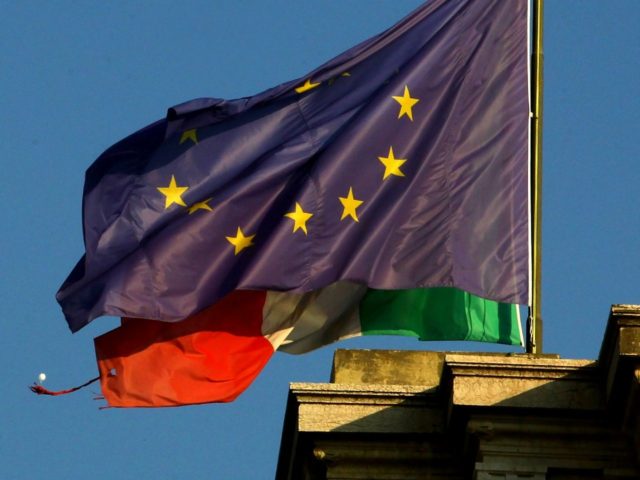As national elections draw near, Italians find themselves further and further removed from the European Union (EU), according to a new study.
Support for the EU has fallen dramatically in Italy over the past 10 years and now ranks among the lowest in all of Europe, according to Berlin-based think tank European Council of Foreign Relations (ECFR), a fact that will benefit Eurosceptic candidates in the upcoming vote.
Whereas many EU member-states “feel increasingly European,” this is not the case in Greece, Italy, France, Poland, Hungary and Spain, the study found.
“The biggest concern is Italy, whose combined fall in structural and individual cohesion (-1.7 points) is the largest of any EU state,” ECFR said. It has gone from being one of the most Europhile countries to one of Europe’s most disaffected.”
“As elections approach, with populist parties railing against Brussels and Berlin, Italy’s cohesion profile is sliding ever closer towards that of the UK, which recently voted to leave the union,” the report states.
ECFR found that confidence in the EU has declined faster in Italy than in any other European nation, as Italians have borne the brunt of both the recent economic crisis and Europe’s ongoing migrant crisis. According to the report, there appears to be “a clear relationship between the refugee crisis and the surge in support for populist parties across Europe.”
Whereas just ten years ago Italy ranked 10th out of the 28 EU nations in its support for the bloc, it now ranks 23rd.
“Out of all founding members, Italy was once likely the most Europhile country,” said political scientist Josef Janning, one of the authors of the study. “There isn’t much left of that nowadays.”
The report notes that growth in nationalist and populist parties, once on the fringes of European politics, has had an impact on the entire EU, and these parties’ preference for bilateral agreements “mirrors that of the current governments in Russia, China, and even the United States – but it is incompatible with the kind of structured integration the EU practises.”
The narrative underlying Eurosceptism concerns “us and them,” the report states, “as well as anxiety that perceived others – be it foreign governments, unelected officials in transnational bureaucracies, or international courts that overrule national institutions – are making important decisions about citizens’ lives.”
According to this narrative, the principal problem arises from a perceived loss of national sovereignty, it states, because this sovereignty is what prevents “them” from making decisions about “us.”
“Italy was hit hard by both of the major crises during the last 10 years, the financial crisis and the refugee crisis,” Janning said.
“At the same time, out of all large member states, Italy is the one country where structural reforms are most needed,” he added. “This makes the country less attractive as a location of business — which, in turn, has damaged its level of structural cohesion.”
Italy’s political parties have coalesced into three principal blocs for the March 4 national elections. Two out of three of the blocs—the new center-right coalition and the anti-establishment Five-Star Movement (M5S)—are both Eurosceptic and are leading in polls. The only Euro-friendly group, former Prime Minister Matteo Renzi’s center-left coalition, has suffered internal divisions and floundering in the polls.
Recent research indicates that Italians have swung significantly to the right in the past five years, with those who self-identify as “liberals” or “progressives” falling by nearly 50 per cent.
Nonetheless, because of anomalies in Italy’s political legislation, none of the blocs is likely to reach the 40 percent needed to form a government, which may mean ongoing negotiations or even a call for new elections next year.
Follow Thomas D. Williams on Twitter Follow @tdwilliamsrome

COMMENTS
Please let us know if you're having issues with commenting.